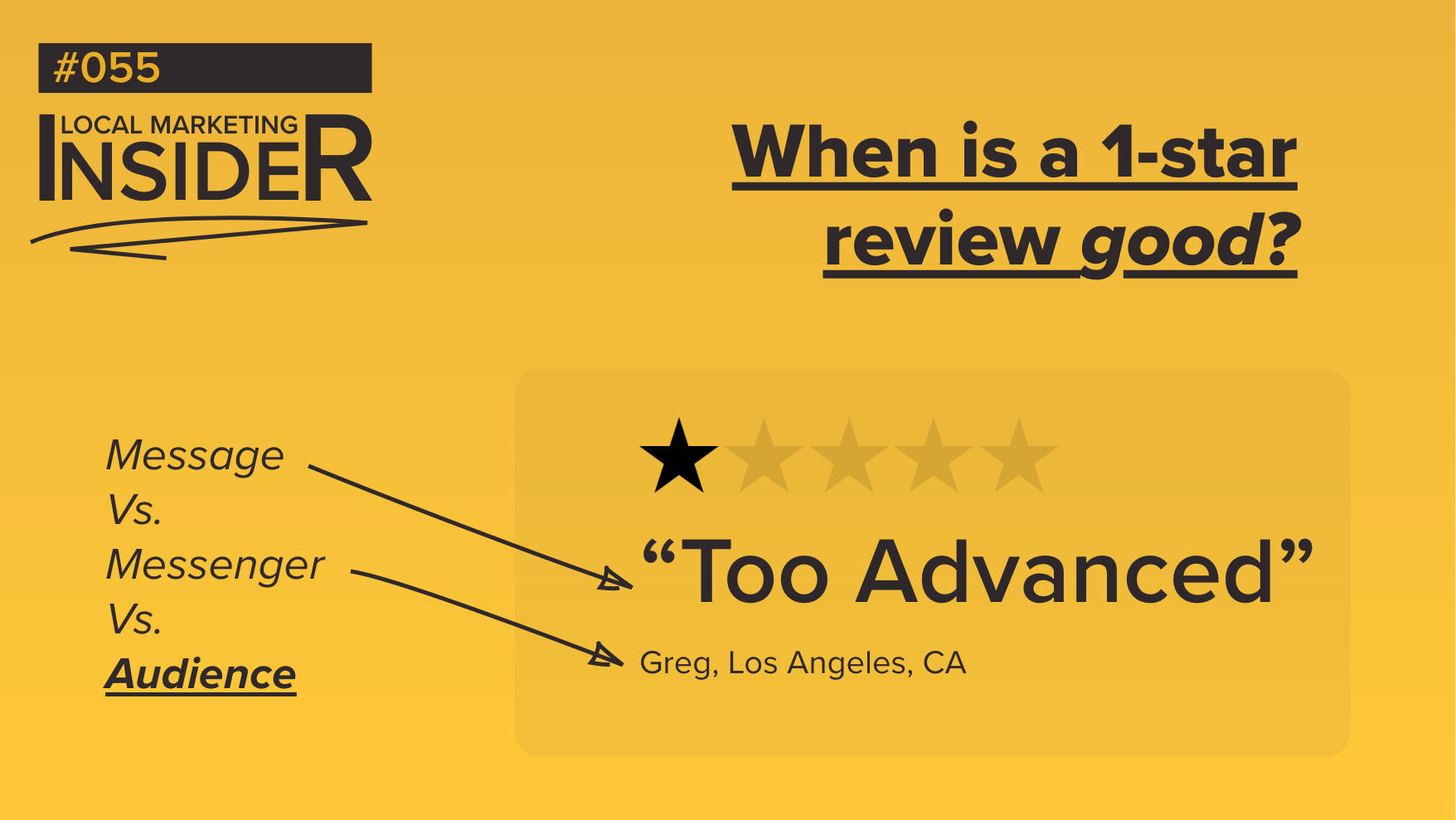- Solutions
- Resources
- Pricing
- Company
Learn how a 1-star review can drive a higher intent to purchase (academic study). How identity, rivalry and belonging are strong motivators and how the message vs. messenger vs. target audience dynamic can create unique outcomes.

Hey! Welcome to Local Marketing Insider where 9,000+ local marketing professionals get better at reputation strategy & more with insights delivered 2x a month.
Read the other 54 articles. Subscribe.
Today, I want to shift focus to the customer.
How review content is so incredibly persuasive but not always in the black-and-white way we may assume.
5-star reviews aren’t always good and 1-star reviews aren't always bad.
This article is about identity.
How identity and loyalty, when you apply the proper pressure, inspire a higher tendency to buy.
The Study
Nailya Ordabayeva of Dartmouth College and Lisa Cavanaugh and Darren Dahl of the University of British Columbia recently completed a study looking at NFL fans and how identity impacts purchase behavior.
300 fans were shown a league-branded hoodie, a one-star or five-star review of the hoodie from a Cleveland Browns fan, and then they were asked a series of questions about their similarity to the reviewer and their interest in the garment.
Why NFL fans? They predictably have a strong sense of identity and allegiance to a specific team.
The results were very interesting from my POV and form the central point of today’s LMI.
The fans who felt “socially dissimilar” from the reviewer (example: fans of the Baltimore Ravens, regional rivals of the Cleveland Browns) AND saw the negative review were 20% more willing to buy the hoodie compared to those that saw the positive review.
Their identity as rivals was the strongest motivator.
As a result, the negative review produced a positive outcome in this context.
As a skier, Snowbird’s ad campaigns immediately came to mind.
This is a form of differentiation or narrowing of focus on best-fit customers by showing off what you are not.
Some more examples:
“Things you can’t say literally can often be said laterally.” - David Abbot
Back to the study, when a group of self-identified non-fans was surveyed, the outcome is in line with what you would normally expect.
“The purchase intent of participants who felt little kinship with the NFL was lower when they read the one-star review than when they read the five-star review, regardless of their degree of social distance.”
So when their identity is not strongly tied to that of the reviewer, the reaction to a negative review is what you would expect, reducing purchase motivation.
Do you have an identity-relevant brand?
Instinctually, you probably already have an idea of whether this applies to your company or not.
Not all brands and products will inspire this type of response.
If you sell cleaning products, you likely won’t have success with this angle. Everyone has to clean. Most don’t tie their identity to it.
Brands that stand out as having a strong identity: Apple, Jeep, Harley-Davidson, Dunkin’.
National identity can be useful here too. Imagine Tim Hortons promoting a negative review left by an American to a Canadian audience. That’s likely to inspire loyalty and affinity amongst Canadians.
If your brand is not identity-relevant, can you make it so?
You can try, yes.
This is an exercise in positioning. To have an identity, you’ll most likely need an enemy. Something your brand is up against that reinforces what it stands for. Thinking about that is a good place to start.
You can also consider adding elements of identity into your products themselves. Going back to the national identity theme: Jeep puts American flags on its products and Canadian outdoor brand Roots works leaves into its designs.
What should we take away from this?
Identity, rivalry, belonging - these are all very strong motivators.
It isn't always just what your customer says that matters. How your target audience interprets that content and the person can be just as impactful.
See you in 2 weeks - Jake, Marketing @Widewail
I’m the Director of Marketing here at Widewail, as well as a husband and new dad outside the office. I'm in Vermont by way of Boston, where I grew the CarGurus YouTube channel from 0 to 100k subscribers. I love the outdoors and hate to be hot, so I’m doing just fine in the arctic Vermont we call home. Fun fact: I met my wife on the shuttle bus at Baltimore airport. Thanks for reading Widewail’s content!
Bite-sized, to-the-point, trend-driven local marketing stories and tactics.
U3GM Blog Post Comments